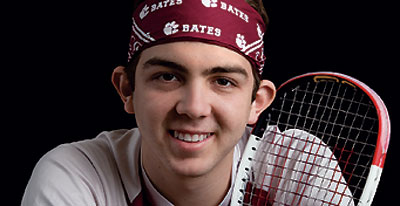Sports Notes
Inside a converted FedEx warehouse just off the Maine Turnpike, on a court measuring 32 feet by 21 feet, two-time All-America squash player Walter Ricardo “Ricky” Weisskopf ’08 delivers a star-making performance nearly every day. Scenes from the show might include Weisskopf, also a top player on his El Salvador national team, running through a “star drill,” darting from center court to spots around the perimeter with footwork so exquisite that the “mere act of witnessing it helps you get better,” says head coach John Illig.
That’s the normal stuff. The feats that get people out of their chairs (or up from one of the comfy secondhand couches scattered about) are what Illig calls “Ricky moments.”

Like when Weisskopf was practicing his rail shots — a stroke similar to a tennis shot down the alley. Over and over, just inches from the side wall, Weisskopf whistled the ball toward the front wall. The ball would rebound, carom off the back glass wall, then drop lazily in front of Weisskopf, who with a flick of the racquet would send it screaming toward the front wall again.
After 40 or so flawless repetitions, with Weisskopf not straying an inch from his spot, the ball landed several inches behind him. So the resident wunderkind reached back with one foot, flicked the ball around his body, hacky style, and resumed hitting with the same rhythm. “We just fell back in our chairs,” said Illig. Like all great athletes, the coach says, “Ricky sees the ball in slow motion.”
Weisskopf finished 25-4 in individual play in 2005–06. Three losses came against players from Trinity (U.S. champion eight years running), the other against Yale’s now-professional Julian Illingworth. “He is far and away the best player that I’ve had in 15 years of college coaching,” says Illig. “When we participate in round-robins at Yale, Trinity, or Harvard, players from other teams seek him out just to watch him play. It’s a new phenomenon for us.”
Summertime means more squash for Weisskopf. In July he competed in the Central American and Caribbean Games in Colombia, bowing out in the quarterfinals to second-year pro Miguel Rodriguez of Colombia. “I kept up with him really well for a while, but if you’re not used to that pace, even though you’re in great shape, you get mentally and physically tired,” said Weisskopf. “He’s going to get to every ball you hit, so your shots have to be perfect. You have that in your mind throughout the game.”
Weisskopf then coached the El Salvador junior team at a Honduran tournament, finding that keeping tabs on teenagers is stressful yet perhaps decent preparation for his duties this year as a junior adviser — a friend, mentor, and ally to fellow Bates students in Milliken House.
And in September, Weisskopf flew back to Colombia to play in the Pan Am Federation Cup. The El Salvador team finished seventh, qualifying for the sport’s biggest spectacle in this hemisphere, the 2007 Pan American Games. Weisskopf again drew Rodriguez and fell in straight games, 9-2, 9-0, 9-5.
At his elite level, Weisskopf must seek out the best competition if he wants to improve. “It’s hard to get to that level because you have to play with them constantly,” he says. But despite his international focus, he is devoted to the Bates program, present and future. “When he competes in South and Central America, he spreads the word about Bates,” Illig notes. “He is ambitious about the future of the team and he cares a lot about our ranking.”
And whether he’s thumping Bowdoin’s No. 1 (or Navy’s or Brown’s) or losing to a pro from Colombia, “he is such a gracious competitor. He shows perfect respect to every one of his opponents,” Illig says. Plus, Weisskopf likes the college atmosphere. “The age difference is minimal, so we’re all going through the same things. It’s easier to relate to each other.” Though English is his third language after Spanish and German — he attended a German-speaking high school in San Salvador, and his paternal grandfather is Swiss — Weisskopf has plunged into his studies as an economics and physics double major. “At first, he had to think through Spanish and German in order to finish assignments at Bates,” Illig says.
Weisskopf has told the folks back home in San Salvador that no, it isn’t as cold as people think, and yes, he really likes the famous lobsters. But whether at Bates or back home, he feels most comfortable on a squash court. At Bates, he almost compulsively visits the Bates squash facility during any free chunk of time, bumming rides from his coach and teammates for the 3.7-mile trip. Besides Weisskopf’s physical gifts — Illig notes his quick feet and hands and “the lungs of Lance Armstrong” — the quality most admired by coach and parents is his focus.
At 16, he realized he had the chance to play and study at a U.S. college. (Weisskopf would make the first contact with Bates, recalls Illig. “His background told me he was talented and smart — attending a German-speaking high school — so I sent him an e-mail response in German, and we hit it off.”) “When he found this possibility, it was always in his mind, [and] he started to move in that direction until he achieved his goal,” says his father, Ricardo Sr. “We were very conscious about the difficulties that had to be solved by a person dedicated to sports and school [but] Ricky always solved that part in an optimal way.”
Illig has his own spin on Ricky’s powers of concentration. “His nature is preternaturally calm, almost phlegmatic,” he said. “He’s the ice man.”